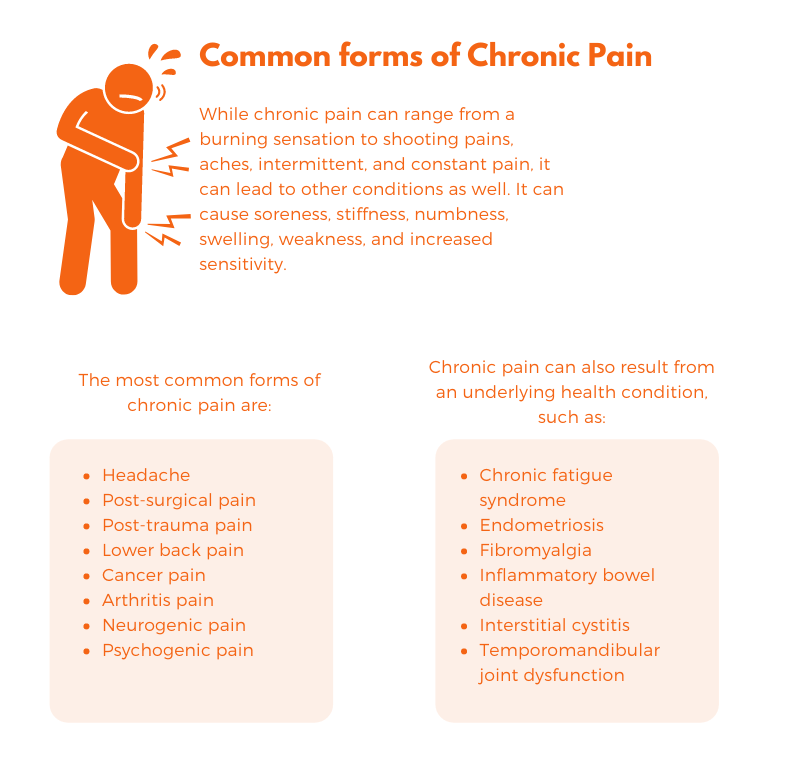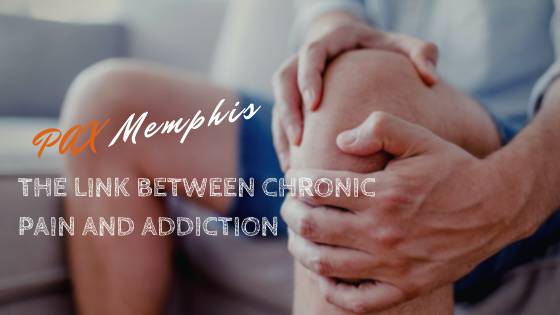Chronic pain is characterized by any pain that persists for 12 weeks or more. Sometimes it can be a dull pain, but sometimes the pain is more severe. Whether chronic pain is caused by an illness or an injury, the pain can be debilitating and greatly impact a person’s quality of life. Individuals who experience chronic pain can face difficulty completing day to day tasks, getting a good night’s rest, and even focusing at work or school. Not only is the pain debilitating, but it can be difficult to diagnose as well. Without any visible symptoms, physicians often struggle to provide patients with long term relief. As a result, many sufferers of chronic pain are prescribed addictive opioids.
Although not everyone who takes opioids will become addictive, people with chronic pain may take opioids for long amounts of time. As the body gets used to the drugs, it can become physically dependent on opioids. In addition, if a person begins taking opioids in higher doses or abuses the prescriptions in any way, they are placing themselves in a position to become addicted.
Chronic Pain in the U.S.
The CDC estimates that 20.4% of adults in the U.S. have chronic pain. In addition, 8% of chronic pain suffers have high-impact chronic pain.[1] Individuals with high-impact chronic pain have pain that is so bad that it often limits their daily life activities. A person suffering from chronic pain may also face fatigue as well as emotional and mental challenges.

Unfortunately, treatment for chronic pain typically focuses on symptom management rather than a cure. As a result, rather than boosting a person’s mobility and quality of life, individuals with chronic pain may fall into depression or begin to experience anxiety. Consequently, these emotions can cause the number of natural painkillers, such as oxytocin, dopamine, and serotonin, to decrease in the brain. This can not only weaken the immune system but make the pain worse as well. To further manage these symptoms, doctors use a variety of prescription medications – many of which carry the risk for abuse and addiction.
Addiction and Chronic Pain
Individuals with chronic pain sometimes abuse alcohol, drugs, or prescription medications for a variety of reasons. Some self-medicate to cope with pain, insomnia, mood changes, or anxiety and depression. On the other hand, some use substances as a recreational activity. In addition, those who are prescribed opioids on a long term basis may continue taking them to avoid withdrawal symptoms. As a result, people who suffer from chronic pain are highly susceptible to addiction.[3]
Although opioids are typically the last resort when it comes to managing chronic pain, approximately 21-29% of patients who are prescribed opioids for chronic pain abuse them. In addition, 8-12% become addicted. This is particularly alarming, after all, 4-6% of people who abuse prescription opioids later begin using heroin. Similarly, 80% of people who use heroin abused prescription opioids first.[4] Despite the high rates of opioid abuse among individuals with chronic pain, oxycodone is still considered an effective strategy to help manage symptoms.
In addition to opioid abuse, alcohol abuse is common among chronic pain sufferers as well. The National Institute on Alcohol Abuse and Alcoholism estimates that 28% of people with chronic pain turn to alcohol to reduce their suffering. However, using alcohol to cope with pain places individuals at a high risk of alcoholism and other health consequences.[5]
Mixing alcohol and pain medication can lead to health problems such as liver failure or gastric bleeding. In addition, it can lead to an elevated risk of substance abuse as well as overdose. Similarly, chronic alcohol abuse is proven to increase pain sensitivity, which can make chronic pain worse and cause people to consume greater amounts of alcohol. As a result, the mind and body can become dependent on alcohol, potentially leading to alcohol addiction.
Treating Chronic Pain and Addiction
Fortunately, there are many substance abuse treatment programs available for people suffering from addiction and chronic pain. Both inpatient and outpatient addiction treatment can help individuals overcome their issues. In addition, many holistic therapies that are used in addiction treatment can be effective in treating chronic pain symptoms.
Many addiction treatment centers combine behavioral and holistic therapies to help patients cope with their emotions. However, these therapies are also programs to help manage specific types of pain without prescription medications.[6] In addition, many safe medications used in medication-assisted treatment not only alleviate cravings but help treat pain symptoms as well.
If you or a loved one is suffering from chronic pain, addiction doesn’t have to be the end of the road. At PAX Memphis, our addiction specialists are experienced with the tools needed to overcome addiction and its existing challenges. Reach out today for help with substance abuse and chronic pain.
References:
- https://www.cdc.gov/mmwr/volumes/67/wr/mm6736a2.htm?s_cid=mm6736a2_w
- https://www.healthline.com/health/chronic-pain
- https://www.mdedge.com/familymedicine/article/76264/addiction-medicine/what-do-when-pain-and-addiction-coexist
- https://www.drugabuse.gov/drugs-abuse/opioids/
- https://www.niaaa.nih.gov/publications/brochures-and-fact-sheets/using-alcohol-to-relieve-your-pain
- https://www.ncbi.nlm.nih.gov/pubmed/27042139
Medically Reviewed: September 25, 2019

All of the information on this page has been reviewed and verified by a certified addiction professional.










